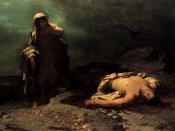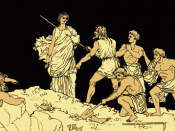"Man is the measure of all things" a statement by the ancient Greek philosopherProtagoras. This statement is intended to imply that the individual human being, rather than a god or an unchanging moral law, is the source of value. In "Antigone", Creon decides to deny burial rights to Polynices. This decision is interpreted as sacrilege and leads Haemon, Eurydice and Antigone to act with rage. Heamon's death and Antigone's and Eurydice's suicide were interpreted as a curse from the gods to Creon's stubbornness. I disagree with Protagoras that man can decide what is right and wrong. This is because man's capability of decision making between right and wrong is highly influenced by greed, lack of knowledge, and excessive pride.
In about 2500 years the interpretations and capacities of man have changed. What was considered right and wrong in Protagoras' times might have been distorted through the years.
Nevertheless, even though 2500 years have gone by, the limitations of man as greed still persist. For example, when man wants to steal money or other material objects from another being, greed modifies the assumption of right and wrong. The person who steals thinks that it is right and the person who is being looted thinks the opposite. In Medieval times, taking the virginity of peasant girls by the feudal lords was not considered wrong. Nowadays, if a person does the same, that for sure is immoral, unacceptable and definitely wrong.
In present era, the time to double the amount of human knowledge is far less than what it took in Protagoras' time. The lack of knowledge affects the capacity of man to distinguish from right or wrong. It still remains one of the greatest challenges of mankind. A person who doesn't know anything in the area of medicine...


